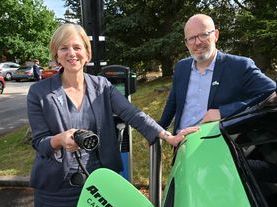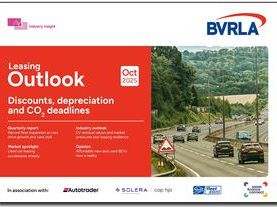The British Vehicle Rental and Leasing Association (BVRLA) has issued some top tips for holidaymakers looking to hire a car this summer.
Whether exploring the UK’s many holiday destinations or taking a vehicle abroad, the BVRLA is issuing a reminder of what you need to consider to ensure a smooth rental experience.
Gerry Keaney, BVRLA Chief Executive said: “There are over 11 million car hire transactions a year in the UK and as the summer holidays approach, we are reminding consumers of the importance of using a BVRLA member for their car rental.
“Hiring from a BVRLA member provides peace of mind that the rental company you are dealing with adheres to a rigorous Code of Conduct and meets industry standards. It also gives the added reassurance of knowing that any unresolved problems can be referred, free-of-charge, to our government-approved Alternative Dispute Resolution service. Those hiring in Europe should use an operator that participates in the European Car Rental Conciliation Service (ECRCS).”
The industry body has also published advice for drivers taking a rented or leased vehicle abroad, which emphasises the importance of having the correct documentation to avoid lengthy delays at the border, or in the worst case, having your vehicle impounded.
Here are the BVRLA’s Top Rental Tips to enjoy a hassle-free car hire experience:
- Use a BVRLA member
If you can see the BVRLA logo when booking a vehicle, it’s a sign that you’re dealing with a company which adheres to high standards and a professional Code of Conduct. You can find your nearest BVRLA rental member by using the association’s Rental Directory.
- Check before you book
Pay close attention to what is and isn’t included in the reservation quote, especially when using price comparison websites. Many companies only provide a basic drive-away quote that may not include additional extras, such as child seats, sat-navs, paperwork for taking the vehicle abroad or additional drivers.
- Tell the rental company how you plan to use the vehicle
Make sure that you tell the rental company if you plan to take the vehicle abroad. Some companies won’t let you take rental vehicles into certain countries. If taking a rental vehicle abroad from the UK you will need to request a VE103 vehicle on hire certificate from your rental company. Failure to inform the rental company that you are taking the vehicle abroad can result in additional costs as per the rental company’s terms and conditions.
- Read the paperwork before you sign the contract
A rental agreement is a legally binding contract and the utmost care and attention should be given when reading the terms and conditions within. Make time to read and understand the Ts&Cs. A copy should be available on the rental company's website or you can ask for a copy of the agreement prior to your rental, so that you can read it in your own time.
- Check if you’re covered in the event of an accident
It’s important to know the difference between the excess waivers offered by rental companies and the insurance policies sold by third-party excess-reimbursement providers – they are not the same product.
You should be aware that the excess reimbursement policy provided by a third party has no connection to your rental company and it does not eliminate your agreed excess. You therefore remain liable for this amount, which is usually held as a deposit on your credit card. In the event of damage or theft of the vehicle you must pay the excess to the rental company and make a claim on the excess reimbursement policy.
It is also worth checking if there are any exclusions in your loss or damage waiver, such as roof, windscreen or tyre damage.
- Be aware of the local road laws and regulations
You’ll be liable to pay a fine, penalty or parking charge notice and administrative fee if you’re caught committing a road traffic offence, parking illegally or failing to pay a toll charge. If going abroad, it is worthwhile familiarising yourself with the driving regulations of the country you’re visiting.
- Consider your fuel options
Your car rental quote will not include the cost of fuel. Most companies will give you the option of buying a tank of fuel from them and returning the car empty or with a full tank. Make sure you remember which option you agreed and avoid returning the with too much or too little fuel.
- Arrive with the right paperwork
Remember to arrive at the rental company with the correct documentation required for collection, such as the credit card used to make the booking and your driving licence. Ensure you have considered any extras or upgrades you may wish to make and how much you are prepared to pay for them.
- Take photos or videos of the vehicle before you drive away
Thoroughly inspect the vehicle inside and out before driving away and familiarise yourself with its controls. Make sure that every chip, dent and scratch is noted on the pre-inspection report. Anything missing should be added. Inspect the wheels, windscreen and lights, as these are common damage areas. Take photographs/videos of any damage on the vehicle before leaving the parking area.
- Don’t drop and dash. Leave enough time to return your vehicle
When returning to the rental depot, allow plenty of time to check over your vehicle’s condition with a rental agent present. If you drop the car off outside of office hours, remember that you are liable for any damage that occurs between you returning it and the company inspecting it.
- Know where to go if you have a complaint
In the unlikely event of a dispute that could not be resolved directly with the rental company, you can escalate your complaint to the BVRLA’s Dispute Resolution Service if you rented a vehicle from a BVRLA member in the UK. This service is free of charge. If you have a complaint for a rental that took place in Europe, the European Car Rental Conciliation Service may be able to help.



